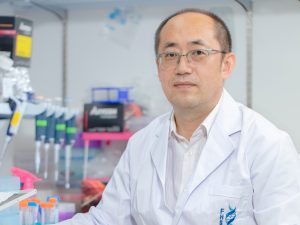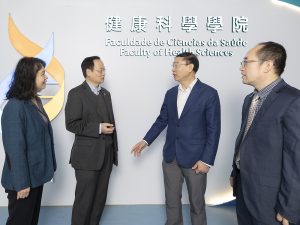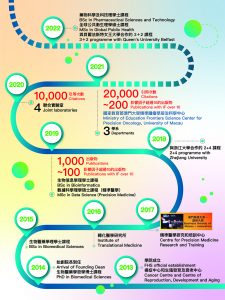Eight years ago, in 2013, the University of Macau (UM) established the Faculty of Health Sciences (FHS) to initiate research in precision oncology in Macao. At the time of its establishment, the faculty recruited a number of leading cancer research experts from around the world. Prof Di Lijun, who was a visiting scholar at the National Cancer Institute in the United States, was one of the first faculty members recruited by the FHS. Over the past eight years, the faculty has developed into a major centre for precision oncology research. This article tells the story behind the faculty’s inception.
Joining UM Out of Admiration for Prof Deng Chuxia
Prof Di’s association with the university began with his personal relationship with Prof Deng Chuxia, dean of the FHS and one of the foremost Chinese-American scientists in the field of life sciences.
After obtaining his PhD from Peking Union Medical College in 2006, Prof Di went to Texas State University as a postdoctoral researcher and was transferred to the National Cancer Institute of the National Institutes of Health in 2007 to work as a visiting scholar. His main research interests include transcriptional regulation of gene expression, gene expression regulatory networks, and understanding the mechanisms of cancer onset, development, progression, and metastasis by exploring abnormal gene expression in diseases such as cancer. So far, he has published more than 20 research articles in journals included in the Science Citation Index (SCI). During his stay in the US, he had the opportunity to meet Prof Deng, who was a senior researcher at the National Institute of Diabetes and Digestive and Kidney Diseases under the National Institutes of Health. At the time, Prof Di was already full of admiration for Prof Deng, knowing that Prof Deng’s research papers were very innovative, that he had made significant contributions in the field of breast cancer pathogenesis, and that he was well known among Chinese researchers in the US. This admiration led to a close association with Prof Deng and his laboratory.
Later, Prof Deng invited Prof Di to join UM. After careful consideration, Prof Di decided that there was little research on cancer disease mechanisms in Macao, and leaving the US for UM would present both opportunities and challenges. ‘According to the blueprint at the time, the university was going to build a new campus, which would be very advanced, both in terms of teaching environment and research facilities. That means for us cancer researchers, there would be a lot of room for future development. With Prof Deng at the helm, I am even more confident,’ he says.
Prof Di says most of the academic staff in the faculty joined the university because of their admiration for Prof Deng’s academic achievements. For instance, Prof Ge Wei, the current vice rector for research, has known Prof Deng for many years. ‘In 2013, when Prof Ge was working at the Chinese University of Hong Kong, he was invited by Prof Deng and UM to join the university and co-found the Faculty of Health Sciences,’ says Prof Di. ‘As Prof Deng was still in the US at the time, Prof Ge served as the interim dean of the faculty for a period of time and they often planned the preparatory work and development of the faculty online.’
Preparation for the Founding of the Faculty
When Prof Di arrived at the university in March 2013, the university had not moved to its current campus yet and the faculty had only just been established, with no offices or laboratories available. When he and his wife, Senior Instructor Wang Li, arrived at the university, the faculty’s dean and associate dean had not yet officially taken up their positions at the university, and the faculty only had two administrative staff members, Together, they worked hard on the administration of the faculty and the acquisition of teaching and laboratory equipment.
Prof Di recalls, ‘The faculty arranged for my colleagues and I to set up a temporary office in one of the rooms in the Pearl Jubilee College, which is today’s Henry Fok Pearl Jubilee College, and we briefly shared laboratories with faculty members of the Institute of Chinese Medical Sciences in order to start research as early as possible. It was not until 2014, when the university moved to the new campus, that we finally had our own faculty building and laboratories. By the time Prof Deng took up the post of dean in December 2014, everyone in the faculty was already like a sharp taut bow, ready to go.’
The FHS was the first faculty to move to the new campus after it became operational on 20 July 2013. ‘I was very excited to witness a fledgling FHS with only a small office growing into a well-developed one with its own teaching building and laboratories,’ says Prof Di. ‘We believe that more space and better facilities will help the faculty to flourish in scientific research.’
Working Together to Enhance the Quality of Teaching and Research
After moving into the faculty building, which has state-of-the-art teaching and research facilities, Prof Di and other newly recruited professors immediately started their research work and published a number of high-quality papers. In terms of teaching, one of the first PhD students under Prof Di’s supervision published five research articles in SCI-indexed journals, several of which have impact factors of over 10. This student completed his PhD studies in less than four years. ‘We were off to a good start,’ says Prof Di. Over the years, Prof Di has supervised many outstanding students, including PhD student Li Jingjing, who received the 2020 Scientific and Technological R&D Award for Postgraduates.
Prof Di is most proud of his students’ accomplishments. He always encourages students to know their abilities and interests before choosing a research topic. ‘Scientists are all intelligent people, so if you want to stand out from a group of intelligent people, you have to do what you’re good at,’ he says.
Excellent Rapport among Colleagues
Prof Di attributes the good rapport between colleagues in the faculty to Prof Deng’s leadership and ability to bring out the best in everyone. He says, ‘During the founding years, we often got together to talk about the future direction of the faculty, especially about oncology research, and we all wanted to develop innovative and effective treatments for cancer. Prof Deng, Prof Ge, and I alone were far from being able to support the sustainable development of the faculty, but with more and more outstanding people joining us, the faculty has been growing steadily. Today, the faculty has become a major centre for the study of precision oncology!’
Prof Di has witnessed the growth of the faculty and feels a strong sense of belonging to the university. �����My wife and I feel very fortunate that we have been able to do the research we love at the university, despite the challenges and pressures we have faced over the years,’ he says.
In the new year, Prof Di is full of confidence about his teaching and research and the future of the faculty. He believes that at a time of deep integration between Guangdong and Macao and the rapid development of the pharmaceutical industry, precision medicine research at UM will flourish and the future is promising.
Source: My UM ISSUE 110



